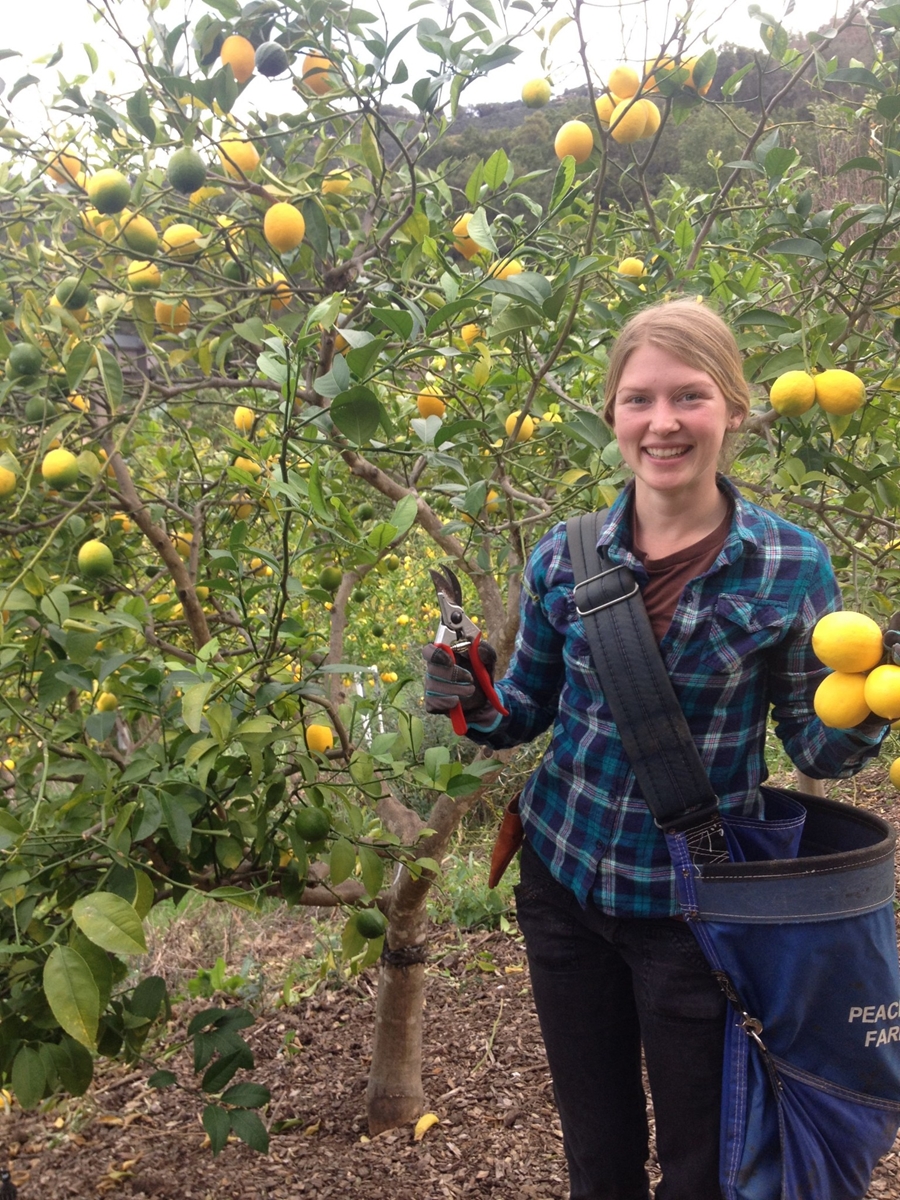
Olivia Caillouet, an honors horticulture junior from Little Rock, believes that "there's only so much you can learn in a textbook - you have to get out and complete it with hands-on learning." She's gotten her hands deep in the soil—and into beehives—through a series of three internships. She did her honors thesis research on a new, deliciously sweet blackberry cultivar here in Fayetteville, and then moved on to work at organic farms in California and Puerto Rico, the former a part of World Wide Opportunities on Organic Farms, or WWOOF, and the latter a newer privately owned organic farm.
Honors: Tell me about your first internship, which was right here in Fayetteville at the Agricultural Experiment Station, correct?
Olivia: Yes, this was related to my honors thesis. I'm evaluating shade effects on primocane fruit blackberries - "primocane" means that it flowers and fruits in its first year of growth, which is not usually the case. We're using shade to reduce heat stress and improve fruit quality. I did a greenhouse experiment and a field study. This is the second year of the study - I'm building on work done by Kat Ginsburg.
We had controls without shade, and areas with 30 percent and 50 percent shade, and introduced shade at different times. It's a lot of data to process, but in general, it looks like using 50 percent shade, later in the summer, is best for highest yield and best fruit quality. It's very exciting stuff to add a puzzle piece to this big picture.
Honors: Last spring you WWOOFed at the Country Flat Farm in Big Sur, California, which grows Meyer lemons, avocados, apples, peaches and oranges - all pretty water-intensive crops. How are they handling California's record drought?
Olivia: It's a huge crisis with water! I wanted to see firsthand what they're doing there. The farm is south of Carmel and there's a spring flowing through it, so it wasn't as extreme there. They have a 42,000-gallon water holding tank and a domesticated spring to fill up the tank - there's no city water running to the farm. The orchard, garden and home are watered from one spring; that spring has sustained the farm since 1984.
We did take measures to conserve water though - we took short showers. Site selection is important, too. The owner found that a site behind the house was a more water intensive microclimate, so he selected a lower plot for planting. We mulched under every fruit tree - layers of chipped wood that we got from a local land trust that was clearing out invasive trees. It's also important to water in the evening or early morning - you never want to water in the middle of the day, which has the highest rate of evaporation.
Honors: You discovered beekeeping there, too.
Olivia: It changed my life! I knew they had hives there, but I didn't realize how much I'd come to love hive maintenance. I got to relocate, combine, and extract honey and wax. I love the connection it shares with horticulture - it's such a symbiotic relationship. So much of the food we eat wouldn't be possible without pollinators.
Honors: So your third internship, this past summer, was at La Tierra Verde in Puerto Rico. What sort of organization is this, and what did you focus on there?
Olivia: It's a privately owned farm, and I found out about it through Dr. Nalley. It's owned by a family from Arkansas. They spent three years searching for the perfect property, and ended up buying the first property that they looked at. The farm was six months old when I got there. They're doing a lot of work to cut back the jungle and regain the structural integrity of the farm.
It was a wonderful contrast to the farm in California, which is 20 years old. I got to see what it's like when you put decades into a farm, versus just starting out. Tierra Verde has five acres of Arabica coffee - it's not in a production state right now. They also grow fruit - oranges, mangoes, plantains and bananas, and pomerosas, which is a small, sweet red fruit. They also have an apiary, and a terraced garden where they grow vegetables and herbs. That garden was my primary focus.
They're also interested in agritourism - there's a cottage there where people can stay. They have 19 acres total, in a bowl-shaped property. They want to further develop this area - build a bridge that takes you through the tree canopy. It's really a magical little place.
Honors: What is your greatest takeaway from these internships?
Olivia: They've really added to my overall academic experience, and directed my career focus. I've learned that I have a passion for teaching and sharing my knowledge of ecologically sound farm practices with others.
I would love to do an outdoor education program, teaching children about the environment. Maybe plant school gardens and develop curricula related to that. I'm not sure what opportunities are available, but finding work with a non-profit would be a good calling for me.
I'm also thinking about grad school, and getting a master's. I'm not sure about the order and the exact direction I'm heading, because I really enjoy research, too. It might be fun to teach at a university, and work with students. Dr. Rom's support and encouragement have been transformative. It's like dropping pebbles in a pond -there's a ripple effect.
Olivia's faculty mentor is Curt Rom, a University professor of horticulture. She recently presented her work at the American Society for Horticultural Sciences in New Orleans, where she won third place in the undergraduate research poster presentation category.
Olivia's research was supported by grants from the Bumpers College and the Southern Sustainable Agriculture Research & Education Young Scholar Enhancement Program, and travel grants from the Honors College and the Horticulture Department Mitchener Undergraduate Research fund.
Contacts
Kendall Curlee, director of communications
Honors College
479-575-2024, kcurlee@uark.edu